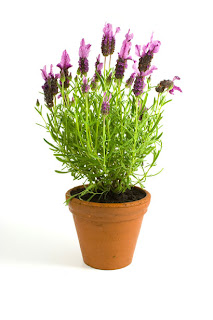
An Intro to Lavender
MY STATUS: Grown Successfully to Harvest
Lavender refers to a genus of flowering plants that includes 39 different species. It is primarily a temperate plant that
prefers dry, well-drained sandy or loamy soils, very different from what Pohnpei has to offer. It does well throughout Europe, particularly in the drier areas such as Spain and Italy, and in Southern and Central California. I knew it would be a struggle to grow it here on Pohnpei, but I'm going to try.
SUNNY & DRY
Lavender
likes lots of direct sun, but isn't keen on humidity. It's
prone to root-rot, which can happen easily when it is planted in soil with lots of organics. For this reason, it's better to
plant it in a mixture heavy with sand or even fine gravel.
It grows quite slowly when it isn't getting maximum sun; it might take 1-2 years for the plants to mature.
FLEXIBLE SOIL REQUIREMENTS
The plant is said to
rarely need fertilizer, performing well in poor soils, and only needs to be watered occasionally.
The purple flowering stocks of the plant are highly aromatic, attracting bees and other beneficial insects that play a role in pollination, while repelling moths and other pests. They are often dried and used in potpourri, aroma-therapy, and flower arrangements.
What I Did
DAY 1 - SOWING
I sowed my lavender at the same time and in the same way as most of my other herbs. The seeds were spread on the top of the soil in 4 paper egg cups and then sprinkled with more soil. I kept the
soil moist but not wet, moved the egg container outside and into direct sun whenever it was available, and kept it inside at night. I used
Ferry-Morse StartSmart seeds purchased from
Home Depot in Southern California (
Lavendula Verea).
 DAY 9 - GERMINATION
DAY 9 - GERMINATION
The lavender seeds germinated and small, fragile seedlings began to develop.
DAY 14
The seedlings are little taller, but still pretty frail looking (
left).
DAY 16 - TRANSPLANTATION
Unlike the other herbs started on the same day, the lavender did not shoot up. It stayed small and near the ground. No true leaves had developed, and I wondered if it wasn't getting enough heat. I decided to plant it in a pot.
SOIL PREPARATION & PLANTING:
- Lavender supposedly does pretty well in pots-- even fairly cramped pots. I chose a 1-gallon pot.
- I began as I usually do with a 1-inch layer of coarse basalt gravel in the bottom.
- The rest of the pot was filled with a 50% fine black sand, 25% Miracle Grow Potting Mix, and 25% local dirt mixture.
- Rather than break apart the soil in the egg cups, I let them dry out a bit, carefully popped them out, and planted the soil plugs in the pot. If I did this again, I might just try to sow my seeds right in the pot to begin with.
DAY 25
The seedlings look healthy, but they are growing
very, very slowly. At this rate it will take YEARS to have real plants!
DAY 27
The seedlings are still tiny and low to the ground (
right). They wilt easily in strong sunlight and don't respond well to watering either.
DAY 29 - APPLICATION OF FISH EMULSION
Since I was fertilizing other plants, I decided to water the lavender with
Alaska Fish Emulsion. What the heck? They aren't doing anything anyway.
DAY 30 - NEW GROWTH AND DEVELOPING TRUE LEAVES
Break-through! Apparently, the lavender wanted a little more food. There was major growth overnight and new sprouts popped up all over the pot (
left). These might be from seeds that hadn't yet germinated, but I'd like to believe they are coming up from the developing root system. Some of the existing seedlings now have the tiny beginnings of true leaves.
DAY 40
The lavender is finally starting to look like a plant, rather than a patch of scrawny seedlings! The stems are thickening and getting some height, multiple sets of leaves popping out (
below). New shoots come up all the time.
DAY 45
Growth is definitely picking up after an extremely slow first month, and you can see in the image (
below) that there has been a significant change from five days earlier, but I still get the feeling this plant is going to take its damn time. It sure smells nice, though!
DAY 56 (4/4)
The growth rate on these little babies continues to accelerate. Some of the stalks are close to
2 inches tall now (
below). They are starting to look like real plants. :)
DAY 72
Who would have thought lavender would do so well on one of the wettest islands in the world?? Not me. Looking at those puny, fragile seedlings in the beginning, I didn't expect them to survive at all. And then they grew so slowly or not at all for the first month. But there you are (
below). At the current growing rate, I'll certainly have flowering plants before the end of the year. The pot is filling out and the plants are definitely thriving. And they're tough. They can take the most brutal sunny days without any wilting as long as I keep them well-watered.
DAY 92
The lavender has filled about 80% of the pot now (
below). Another month and the whole thing will be full.
DAY 100
Plant stems are starting to get woody, but the plant hasn't spread as much in the last week as it was before.
DAY 165
The lavender is looking like it might not be too long before I get some blossoms. It smells amazing and attracts all sorts of butterflies. Unfortunately, we don't have bees here. :( Just saw a recipe for lavender cookies that I'd like to try eventually. Here's what it looks like now (
below).
DAY 209 (9/5) - DIE-OFF FROM ACCIDENTAL OVER-WATERING
At first I thought the plants were being baked in our extremely hot temps we've been having all summer, but lavender is a Mediterranean plant and thrives in hot, dry weather. Then I thought something might actually be eating the woody part of the plant. I've observed tiny little creatures in the soil. They look like little wood lice. Now I'm pretty sure that the problems stem from
too much water. For a while the plant was near the outer edge of the garden shelter and was getting wind-blown rain. About a third of the plant, near the center, turned gray and withered. When I pulled at the dead parts, they came out and the roots were clearly rotten--an obvious sign of damp soil. I've put the plant in a spot where it will stay 100% dry and I'm going to wait and see what happens. Hopefully, if the soil dries out, the part of the plant that is still in good shape will have a come-back and survive. There was a major time investment in growing lavender here; I'd hate to lose this plant. I may take some cuttings, too, just to be safe.

 DAY 9 - GERMINATION
DAY 9 - GERMINATION





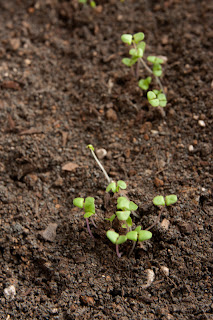


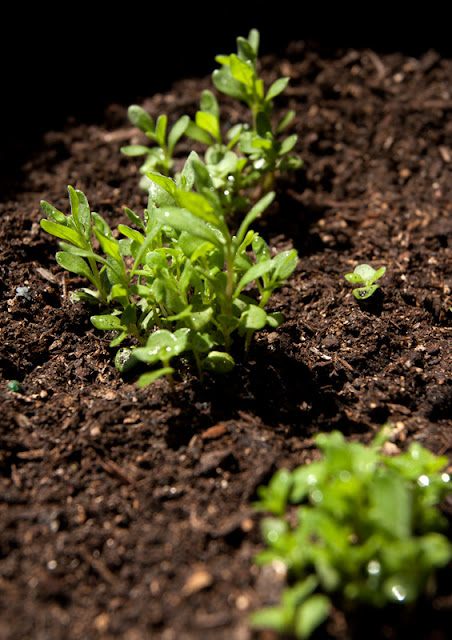
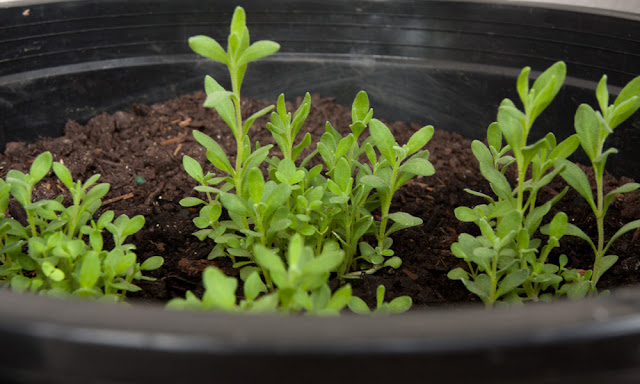

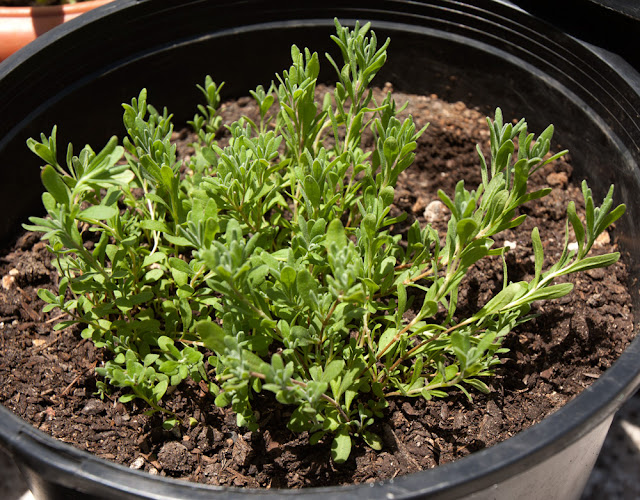




.jpg)







0 comments:
Post a Comment